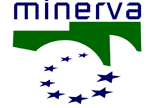| About Minerva | ||
| Structure | ||
| NPP | ||
| Good practices | ||
| Competence centres | ||
| Digitisation guidelines | ||
| Enlargement | ||
| Events | ||
| References | ||
| Publications | ||
Path: Home | About Minerva | Rationale
RationaleIn December 1999 the eEurope initiative was launched by the European Commission to bring the benefits of the Information Society to all Europeans, followed in June 2000 by the eEurope 2002 Action Plan, agreed by Member States to achieve the previously defined targets. In its objective 3 (Stimulate the use of the Internet), the plan underlines the importance of content industries in creating added value by exploiting and networking European cultural diversity. To strengthen this aspect, both Member States and the Commission have the role to facilitate and ensure the availability of content for digital networks. In particular, within that objective, there is a specific action to "Create a coordination mechanism for digitisation programmes across Member States". The content industries are indeed a fast growing segment of the European economy, and the European Commission, beginning with the Impact and Info2000 programmes and including the current eContent action, has clearly identified this sector as a priority area. The extensive cultural heritage and linguistic diversity of Europe creates the foundations for a vibrant digital content industry, able to fully exploit the opportunities offered by digital technologies. For this reason, support for digitisation of European digital content is essential, to involve the hundreds of thousands of existing museums, libraries, historic sites, arts bodies and archives. The key objective is to make more accessible and more effectively exploited the wealth of information there contained. The key objectives are:
The cultural and scientific heritage of Europe has a significant impact on its social and economical development. Digitisation of these resources becomes then a major activity for increasing and improving access of citizens to information and for preserving European cultural heritage. Furthermore the cultural diversity of Europe can receive an important boost from the availability of digital assets, which can play a crucial point in several fields: education, tourism and media industries. They can also be very effective in promoting cultural diversity and enhancing understanding of different cultural, ethnic or religious backgrounds of communities across Europe. European countries have already invested significantly in programmes for digitising cultural and scientific content. These activities have included several areas, such as museum objects, archaeological and environmentally important sites, music and audio-visual archives, bibliographic materials, documents and manuscripts. The main challenges are now promoting the uptake of new technologies for the digitisation of cultural and scientific content, ensuring lasting accessibility and preservation, the development of new services and job opportunities. Other important objectives include strengthening the European content industry and stronger support for its co-operation with educational communities, with consequent mobilisation of material and immaterial resources. The achievement of these goals is threatened by some constraints, creating important risk factors:
As previously underlined, the European Commission is playing an active role in promoting initiatives to support the content industries in the new technological environment: the MEDIA plus programme promotes the audio-visual sector, the eContent action - following the previous INFO2000 and MLIS programmes - promotes the use of digital content linguistic diversity in the information society. The Culture2000 Programme is also an important element for involving and making cultural actors aware of the new opportunities, since it aims to promote cultural dialogue, creativity and the transnational distribution of culture, the promotion of cultural diversity and common cultural heritage, and improving public access to culture. This interest also touches co-operation with other Mediterranean governments: for instance EUROMED and EUMEDIS are initiatives aiming at interconnecting the Euro-Mediterranean research communities and at launching pilot projects in several sectors of intervention, including multimedia access to cultural heritage and tourism, and preservation of cultural heritage. In fact, a closer contact between EU and member states' policy in this field is essential to speed up the process: actions at national level should be interconnected, and complemented by a central co-ordination of digitisation programmes across Europe to ensure wider access to Europe's common heritage. On 4 April 2001, representatives and experts from the Commission and Member States met at Lund in Sweden to discuss these issues and to make recommendations for actions that support coordination and add value to digitisation activities in ways that would be sustainable over time. The present proposal intends to start from the conclusions, the Lund Principles, available on-line in all EU languages, endorsed by Member States and underlining risks of loosing the opportunities arising from applying new technologies at cultural and scientific content for the future Knowledge Society in line with eEurope Action Plan, and the following meetings held in Brussels on 17th July and Mons on 22nd September under the Belgian Presidency, and to facilitate the adoption of the Lund Action Plan. For this reason, the Member States partners of the MINERVA project commit themselves to identify solutions in order to:
|
|
||||||||||||||||||||
|
Copyright Minerva Project 2003-04, last revision 2003-08-27,
edited by Minerva
Editorial Board. URL: www.minervaeurope.org/whatis/rationale.htm |
 |

